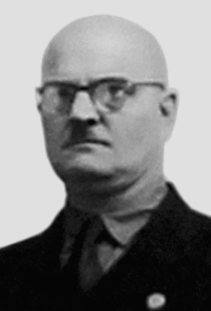Christian Wirth
Nazi German police chief, extermination camp commandant, Holocaust perpetrator (1885–1944)
Christian Wirth (24 November 1885 — 26 May 1944) was a German policeman and SS officer who was one of the leading architects of the program to exterminate the Jewish people of Poland, known as Operation Reinhard. His nicknames included Christian the Terrible and The Wild Christian.

Wirth worked at scaling up the Action T4 program, in which disabled people were murdered by gassing or lethal injection, and then at scaling up Operation Reinhard, by developing extermination camps for the purpose of mass murder. Wirth served as Inspector of all Operation Reinhard camps. He was the first Commandant of Bełżec extermination camp. He was later killed by Yugoslav partisans in Hrpelje-Kozina near Trieste.
Quotes
edit- If you do not like it here, you can leave, but under the earth, not over it.
- Wirth speaking to the SS personnel at Sobibór extermination camp, from H.E.A.R.T. - Holocaust Education & Archive Research Team
Quotes about Christian Wirth
edit- Though it was the most efficient, Auschwitz was not necessarily the cruellest of the Nazi death camps. The first people to be gassed by the Third Reich were, as we have seen, German mental patients; they had been asphyxiated with pure carbon monoxide gas. This method was then exported to Eastern Europe, but using exhaust fumes, first in specially converted vans, then in static gas chambers equipped with large diesel engines. This was how people were killed at Sobibor, Treblinka and Belzec, the camps set up to implement the 'Action Reinhard' in the autumn of 1941. Compared with inhaling Zyklon B, which killed most victims within five to ten minutes, this was a slow way to die. Rudolf Hoess, the commandant of Auschwitz, regarded his own methods as 'humane' compared with those of his counterpart at the last of these camps, the notoriously sadistic Christian Wirth.
- Niall Ferguson, The War of the World: Twentieth-Century Conflict and the Descent of the West (2006), p. 507
- Wirth was a gross and florid man. My heart sank when I met him. He stayed at Hartheim for several days that time and often came back. Whenever he was there he addressed us daily at lunch. And here it was again this awful verbal crudity: when he spoke about the necessity of this euthanasia operation, he was not speaking in humane or scientific terms, the way Dr. Werner at T-4 had described it to me. He laughed. He spoke of 'doing away with useless mouths', and that 'sentimental slobber' about such people made him 'puke'.
- Franz Stangl in a 1971 interview. From Gitta Sereny, Into That Darkness: from Mercy Killing to Mass Murder, a study of Franz Stangl, the commandant of Treblinka (1974, second edition 1995). Page 54 in the Dutch version of the book. Also found in Yitzhak Arad (1987). Belzec, Sobibor, Treblinka: The Operation Reinhard Death Camps, Bloomington: Indiana University Press, pp. 24-27.
- From my activity in the camps of Treblinka and Sobibor, I remember that Wirth in brutality, meanness, and ruthlessness could not be surpassed. We therefore called him 'Christian the Terrible' or 'The Wild Christian'. The Ukrainian guardsmen called him 'Stuka'. The brutality of Wirth was so great that I personally see it as a perversity. I remember particularly that on each occasion, Wirth lashed Ukrainian guardsmen with the whip he always kept...
- Franz Suchomel, from Yitzhak Arad. Belzec, Sobibor, Treblinka: the Operation Reinhard death camps, p. 183-186. Indiana University Press, Bloomington, 1987.
- If only someone had had the courage to kill Christian Wirth — then Aktion Reinhard would have collapsed. Berlin would not have found another man with such energy for evil and nastiness.
- Franz Suchomel, from Tregenza, Michael. Christian Wirth: Inspekteur der Sonderkommandos, Aktion Reinhard. Vol. XV, Lublin 1993, p. 7.
- To tell the truth, one did become used to it... they were cargo. I think it started the day I first saw the Totenlager [extermination area] in Treblinka. I remember Wirth standing there, next to the pits full of black-blue corpses. It had nothing to do with humanity — it could not have. It was a mass — a mass of rotting flesh. Wirth said 'What shall we do with this garbage?' I think unconsciously that started me thinking of them as cargo.
- Franz Stangl, from Yitzhak Arad (1987). Belzec, Sobibor, Treblinka: The Operation Reinhard Death Camps, Bloomington: Indiana University Press, pp. 24-27.